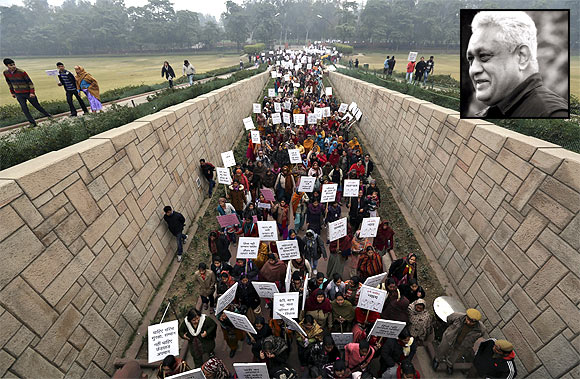‘Anyone of them could have been the girl. So in a way it had what I call the ‘rakhi effect’. Everyone felt the rape victim could have been my sister and everyone felt that could have been myself.’
Professor Shiv Visvanathan speaks to Rediff.com‘s Sheela Bhatt on the recent demonstrations by India’s youth, and on current political and social trends.
You can expect Professor Shiv Visvanathan, intellectual and author, to start a lecture on Society in Transition with the sentence, “Soil is the basis of Constitution of the nation.”
Without using unnecessary narrative he can explain where and how the Planning Commission of India is failing. At a recent lecture in New Delhi, he said, ‘The Planning Commission looks at violence in a sanitised way.’
Professor Visvanathan has a habit of forcing listeners and readers to shed their laziness and think. Like when he asked, ‘Can you have 5,000 varieties of rice in our Constitution?’
A social anthropologist with a PhD from Delhi University, Professor Visvanathan taught at the Delhi School of Economics. He was a senior fellow at the Centre for the Study of Developing Societies where internal politics prevented him from becoming the head of the institution.
Till recently, he was a professor at the Dhirubhai Ambani Institute of Information and Communication Technology, but Gujarat Chief Minister Narendra Modi’s government didn’t find his presence in Gandhinagar suitable, so he was thrown out unceremoniously by the management.
He is currently a professor at the O P Jindal Global University, Sonepat, Haryana, and is working on the effects of the Kudankulam nuclear power project in Tamil Nadu and on the issues raised by human rights activist Irom Sharmila of Manipur, the feisty activist who has been on a hunger strike since 2000 against the misuse of the Armed Forces (Special Powers) Act, 1958.
Professor Visvanathan has taught in educational institutes around the world, which includes the University of South Africa and Stanford University in the United States. He considers Alfred Wallace, the 19th century British scientist and a colleague of Charles Darwin, his guru.
It’s difficult to put him in a bracket or under single heading. He is a social anthropologist, teaches philosophy, is a crazy film buff, is like a nomad who never got real institutional support to flourish. He is curious, an avid listener, and he speaks loudly.
He has the courage of convictions to write what he thinks. His career trajectory shows that, basically, he is a fine human being.
His books Organising for Science and A Carnival for Science have been very well received. He has co-edited Foul Play: Chronicles of Corruption 1947-1997 with Harsh Sethi.
In an exclusive interview with Rediff.com‘s Sheela Bhatt, the professor discusses the recent youthful demonstrations on current political and social trends.
He also tries to give us an idea how Narendra Modi will perform if he becomes a resident of 7, Race Course Road, the Indian prime minister’s official residence.
The first of a two-part interview:
In 2013, if a person like you, takes a long shot of what is happening in urban India, what would you see?
How do you see urban India’s mindset right now?
I think it’s a protest of very everyday issues. A girl going to the office and coming back, if that whole act becomes an adventure that frightens the parents, so they have to sort of clock her on a mobile phone, the civics of the city are breaking down.
In a way I think the protest at India Gate was about people saying that a city is a form of social contract and the contract is broken down because the police won’t protect you, the goons can do what they like and the way the city is growing doesn’t allow for young people to congregate safely.
So they are harassed in parks, gang-raped anywhere they like and people use the anonymity of the city to escape. So in a way the city protects the villains rather than the subjects of the city.
The city does not protect the citizens. So in a way it was a protest about very simple things.
Young people protesting and family networks protesting.
So at one level it was a very conservative kind of protest and a very naive kind of protest.
Many of those kids were protesting for the first time. They didn’t know what was happening.
The first time they were charged with water cannons and they were totally stunned. They never knew the State would hit them with water cannons because they were protesting about the State’s neglect.
I think it taught them an important lesson, that anyone is vulnerable in this city. And you are vulnerable not only to gang-rape, but also from the agency of the State itself, and I think that was an important lesson.






Leave a reply